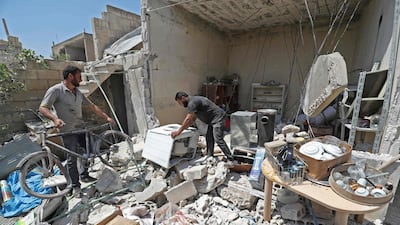It lasted barely more than two days: a ceasefire in Idlib, the last redoubt of rebels fighting to overthrow Syria's Bashar Al Assad, as well as home to more than three million civilians, swiftly collapsed last week.
Civilians who had gone back home found themselves in the crossfire and fled yet again. Half a million people have been displaced since May and nearly 800 killed.
It is proof yet again – as if more proof were needed – that the Assad regime can never be a partner for peace in Syria. It never was, and it never will be. Its continued survival will ensure that whatever peace reigns in Syria when the guns fall silent will be short-lived, rendered inherently unstable by the regime’s chronic inability to adhere to any good-faith agreement or compromise.
The assault on Idlib began in earnest four months ago and was stepped up in July with an intensified aerial campaign. The result was a series of war crimes – the systematic targeting of schools, bakeries, markets, rescue workers and hospital facilities, some of which had shared their GPS coordinates with the UN to avoid being bombed.
The civilian suffering, exacerbated by the fact that many residents were themselves refugees from elsewhere, and because most of the population consists of women and children, has been extreme. But hopes for a reprieve were rekindled by a ceasefire deal that was announced on August 1 and which came into effect the following day. Civilians returned to towns like Khan Sheikhoun and Maarat Al Numan, which had been emptied of their inhabitants because of the routine bombardment of civilian targets by the regime and its allies.
The ceasefire itself only lasted until August 4, ending with a regime-fuelled barrage of violence that included dozens of air raids and mortar shells. Government forces advanced and over the weekend seized new territory from the rebels fighting them. Civilians who had returned to their homes, navigating through the rubble that was their towns, were forced to flee again, spending the Islamic holiday of Eid Al Adha on the run, often scattered in refugee settlements or with no shelter from the bombardment from the skies.
The Syrian regime violated the deal, ostensibly because the main militant group that controls Idlib, Hayat Tahrir Al Sham, extremists who were affiliated with Al Qaeda, refused to pull back from a buffer zone that separates the two sides and demilitarise it in line with a prior agreement negotiated by Russia and Turkey. The terrorists of HTS, who have faced sustained protests by Idlib’s civilians in rejection of their ideology, are unlikely to adhere to the regime’s terms.
But this quid pro quo is nothing but a cruel joke. Idlib’s helpless civilians can do little to force the armed militants of HTS to disarm, nor should three million civilians be collectively punished for the intransigence of the militants.
The regime has repeatedly violated the norms of war generally and ceasefire agreements specifically in its campaign to militarily reclaim the country from the opposition, never letting deals signed by its own representatives or its allies stand in the way of its scorched earth bombardment of Aleppo, the suburbs of Damascus, Idlib, or other key battles that it has won. Last year, a ceasefire in Eastern Ghouta that was agreed to by Moscow before the United Nations Security Council was promptly and unilaterally discarded, the regime and its allies choosing to resume a brutal siege that culminated in a chemical attack on the city of Douma and the subsequent surrender of the opposition.
The repeated tearing up of ceasefire deals throughout the country over the past few years of regime military gains should give pause to those who are now proposing rapprochement with Mr Al Assad, perhaps seeking a place at the table or an opportunity to draw him away from his Iranian allies. Such hopes will be met with deceit.
But the more tragic reality behind the regime’s serial dishonesty is that ordinary Syrians cannot ever believe it. A common refrain whenever I interviewed opponents of the regime, during brief lulls in the fighting, was that “Assad cannot be trusted”. This has been confirmed on multiple occasions but what it means more broadly is that the regime is committed to complete military domination, and rhetoric that pays lip service to political reforms and human rights will remain just that. There will be no reforms once the regime has won, no gesture of conciliation or concession to its defeated rivals, nothing but the attempted return of totalitarian military control. Its worst instincts will prevail over counsel that points out it cannot hope to hold a country so fragmented and torn by war without fundamental changes and that Syria cannot be stable amid this injustice for long.
Right now, Mr Al Assad’s victory appears to be a foregone conclusion. But what Idlib has shown is that any deal whose basic outcome isn’t a transition away from this regime is a farce, which will sooner or later lead to renewed fighting. That price will be paid by Syria’s embattled civilians and the international community that allowed such a proposition to take hold in the first place.


